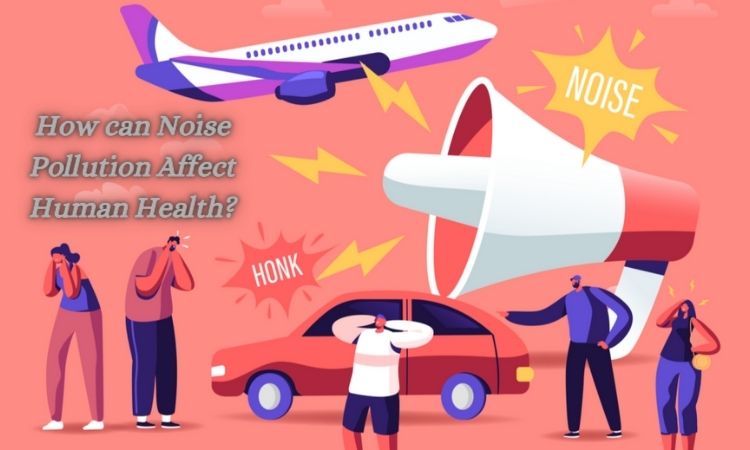
When unwanted noises enter the environment, noise pollution develops. In Europe, noise pollution is becoming a bigger issue, and many people may not be aware of the effects it has on their health. Increased stress levels, disturbed sleep, or damage to the hearing are some of the possible health implications of noise pollution.
Noise pollution, often known as sound pollution, is the spread of sound or noise that has varying effects on human or animal behavior, most of which are negative. Machines, transportation, and propagation systems are the principal causes of outdoor noise all over the globe. Side-by-side industrial and residential buildings can cause noise pollution in residential areas, and poor urban design may lead to noise disintegration or pollution.
Noise pollution is frequently disregarded as a health risk in comparison to other forms of pollution. However, an increase in human activity is responsible for the increased noise pollution that many people are now experiencing.
Common sources of noise pollution include:
Hearing Loss
Hearing loss brought on by noise is the most noticeable impact. Hearing loss can occur at sound levels greater than 85 decibels. A gas lawn mower (91 dB), hair dryer (94 dB), very loud headphones (100 dB), and an airplane departure (120 dB) are just a few examples of everyday noise sources that might harm your hearing. Hearing loss sets in about 85 dB after roughly 8 hours of exposure, but just 2 hours later at 91 dB, a 6-dB increase.
Reduced Brainpower
Environmental noise pollution has been proven to have a negative impact on children's cognitive development and learning results. The children's reading ability, memory, and performance on standardized tests are lower compared to kids who aren't exposed to noise at school the more frequently a classroom is exposed to noise from airplanes, cars, or trains.
Sleep Problems
It has been determined that the greatest harmful effect of environmental noise pollution, aside from hearing loss, is sleep disruption. Poor sleep can lead to mood swings, daytime drowsiness, and a decline in cognitive function. Cardiovascular disease is a serious long-term impact of inadequate sleep.
Cardiovascular Problems
Heart disease and noise pollution have long been connected. The fight-or-flight response of the neurological system and a rise in stress hormones like cortisol are all brought on by noise. Repeatedly overwhelming the body with stress hormones over time can harm the cardiovascular system.
Impact on Mental Health
According to research, people who live in residences with one side of the house surrounded by road traffic feel irritated and have less time to unwind throughout the day. This is true even at a maximum noise level of 68 dB, which is comparable to the volume of a typical TV. However, those negative impacts were much diminished if inhabitants relocated to the side of the house away from the noise of the road.
Even when we are sleeping, the brain is always listening for signs of danger. Therefore, frequent or intense noise might cause anxiety or stress. A person's reactivity to stress rises with continuous exposure to noise pollution.
People who are exposed to noise pollution may get anxious tense, frustrated, or furious. The influence on a person's mental health increases if they believe they have no control over the level of noise in their surroundings.
Noise pollution might sometimes be unavoidable. There are, however, strategies to lower noise levels within the house. One may try:
Appliance noise reduction: The total noise levels in a home may be affected by things like air conditioners, heaters, fans, and other equipment. Try turning them off more frequently or using a timer to make sure they only turn on at specified times.
Media device noise reduction: Think about the level and length of noise from radios, televisions, and video games. Avoid listening to loud noises or keeping unnecessary background noise on for an extended amount of time. Setting aside a certain time to watch TV or listen to music may be beneficial.
Repair or replace outdated equipment: Older models of machinery, vehicles, and other items might be noisier. Think about replacing or improving your loud household items.
Soundproofing: Strategically placing insulation throughout the house can help block out noises coming from the outdoors, nearby neighbors, or other rooms. Curtains, carpets, and rugs may also be helpful.
Create more quiet time: More quiet time can be achieved by routinely scheduling time for things like reading, puzzles, or creative hobbies. During this period, refrain from playing music or creating background noise.
Ear protection: To lessen the impact of loud noise if it is unavoidable, use ear protection, such as earplugs or earmuffs.
Final Word
Both on land and at sea, noise pollution may harm both human and wildlife health. Loud or constant noises can lead to hearing loss, stress, and high blood pressure. These sounds can range from highway noise to rock concerts.
An unseen threat is noise pollution. Although it cannot be seen, it exists both above and below the surface of the water. Any undesired or irritating sound that has an impact on the health and welfare of people and other living things is considered noise pollution.
It could be able to lower noise levels in the house, classroom, or office by making little adjustments such as soundproofing and turning off electronics.